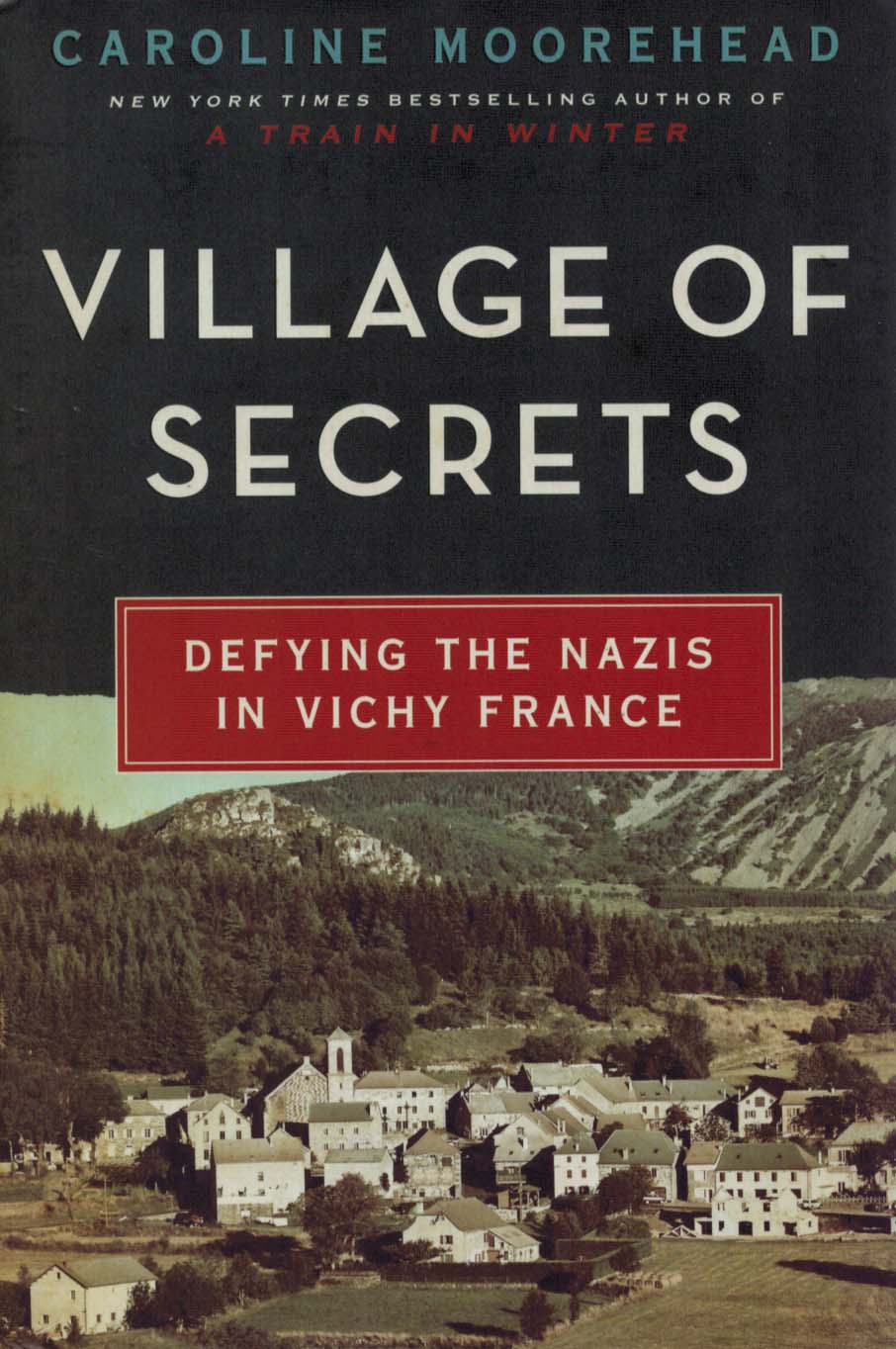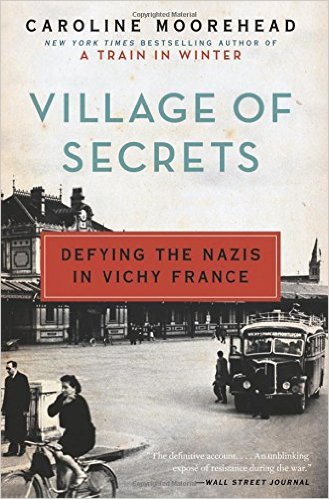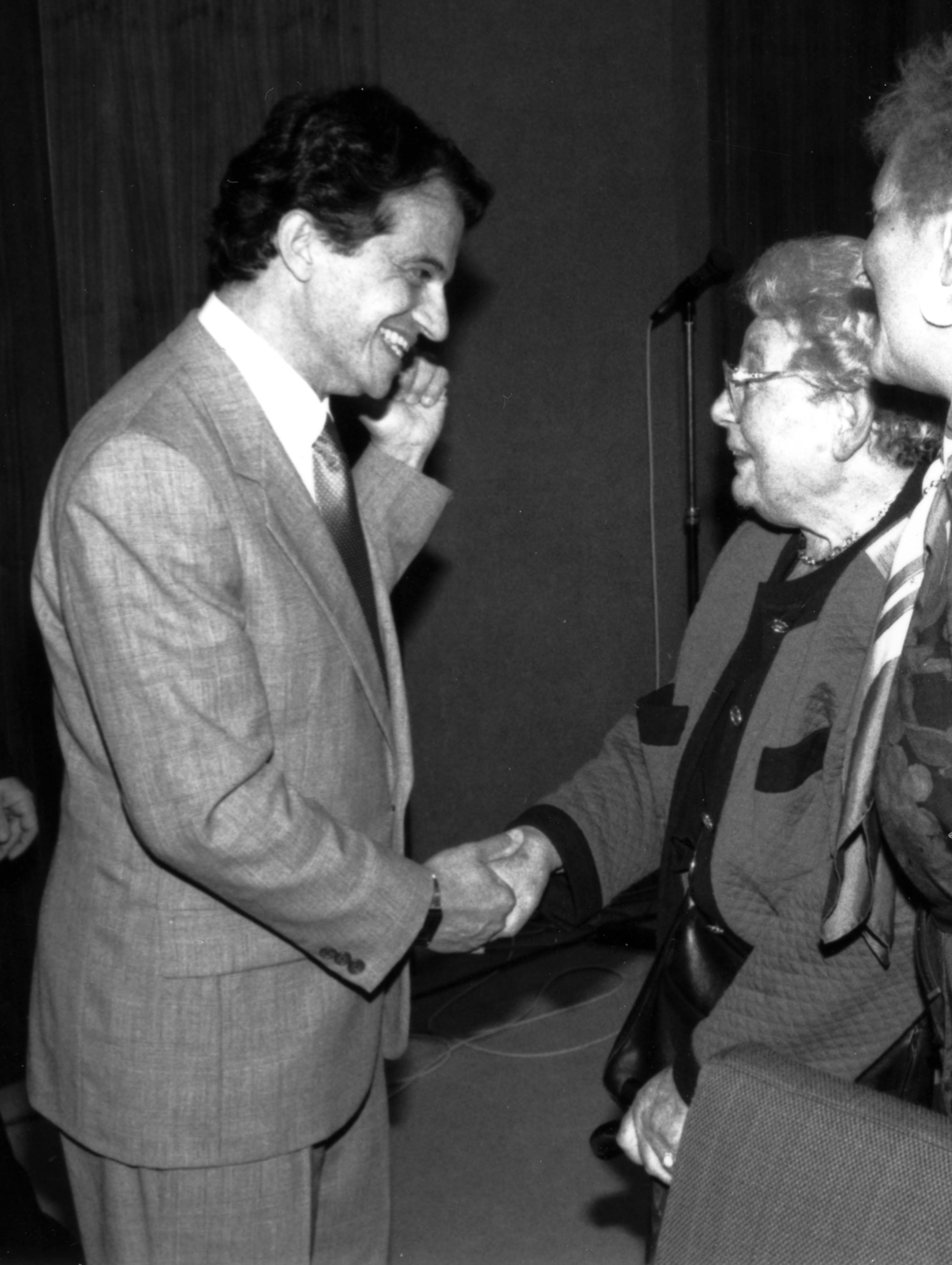[Varian Fry Institute]
[Chambon Foundation Home]
Caroline Moorehead's book Village of Secrets

 What’s wrong with these pictures?
What’s wrong with these pictures?
The cover photographs are not of the purported "village of secrets"!
Introductory Comments by Pierre Sauvage
director, Weapons of the Spirit
Caroline Moorehead's Village of Secrets, a 2014 book on the rescue mission that occurred in and around the village of Le Chambon-sur-Lignon during the Holocaust, had been short-listed for the prestigious British Samuel Johnson Prize for Non-Fiction. The book, at least, did not win. However, it received positive and even rave reviews (see below) from people who obviously knew nothing about what happened in Le Chambon.
I hasten to admit that I have a personal stake in this. In British author Moorehead's eagerness to be able to claim that she is, at last, setting "the record straight" and describing for the first time "what actually took place" in and around Le Chambon—a story she contends "has never fully been told"—she finds it necessary to go out of her way to malign the late Philip Hallie, author of the pioneering 1979 study "Lest Innocent Blood Be Shed," and me, who just happen to have told the story before her.
In an article in London's The Guardian, Caroline Moorehead raised the ante. In the October 2015 American paperpack edition of her book, Moorehead raised the ante still further, appending her defamatory remarks to the book!
Responding to the complaints Max and Hanne Liebmann (survivors of the French internment camps who found shelter in Le Chambon and who figure prominently in Moorehead's account), Nelly Trocmé Hewett, daughter of pastor André Trocmé of Le Chambon, and I have expressed about the book, Moorehead alleges that "a particular group, united around the activities of a single man [pastor Trocmé], had appropriated the story, forged [sic!] their own version of events and would consider no other."
She withholds from her readers the fact that her critics have an intimate connection with the story of Le Chambon. Instead, Moorehead claims that she took "immense care" in navigating between "conflicting truths," adding that she was "shocked" by the "malice and personal nature of the attacks." Read on, and judge for yourself where there has been malice and personal attacks.
In my case, Moorehead went so far as to fabricate the utterly false allegation that key figures in Le Chambon's wartime events, rescuer Madeleine Barot and local Resistance leader Pierre Fayol, branded my feature documentary about Le Chambon, Weapons of the Spirit, as nothing less than a "mutilation of historical truth." In the original British edition of the book, it was even falsely claimed said that these people called me nothing less than a "revisionist"—a denier of the Holocaust!
The photograph of Madeleine Barot below is of the greeting she gave me after a Paris screening of Weapons of the Spirit. (My interview with the admirable Madame Barot will be part of the remastered 30th-anniversary edition of Weapons of the Spirit.) She admired my film and never attacked it!
As for Pierre Fayol, the Resistance leader inscribed one of his books on armed resistance in the area to me as follows: "For Pierre Sauvage, whose very beautiful film presents one aspect of Le Chambon during the war and who will find in these pages another aspect. In friendship, July 3, 1988."
The truth is that my friends Madeleine Barot and Pierre Fayol never accused my film of being a "mutilation of historical truth," never accused me of being a "revisionist," and never accused me of "approximaions, inexactitudes and extrapolations" (also a charge in the British edition modified in the American edition and then in the revised British edition).
For further background about all of this, please see British scholar Dr. Neil Foxlee's thoughtful review, Memory Wars in the Massif Central. Foxlee underscores the spurious nature of Moorehead's claim that she is, at last, recounting "what actually took place." This is indeed mean-spirited fiction meant merely to discredit previous work on Le Chambon.
As it happens (though Moorehead withholds this information from her readers), my parents were among the Jews who found shelter in the area of Le Chambon, France, during the Holocaust, and I had the good fortune to be born there at that time. I thus have reasons to care deeply about the remarkable rescue mission that profoundly affected my life.
It is thus equally dismaying that this account of those events—far from setting "the record straight"—preposterously asserts that the French Protestant (Huguenot) dimension of the rescue effort has been inflated into a myth, that the village's remarkable pastor can be plausibly charged with being a self-aggrandizing pathological liar, that nonviolence was only a small part of the story, that unnamed atheists and agnostics played an equal role in providing shelter, that indeed the religious beliefs of the rescuers deserve only passing mention...
Moreover, the book is riddled with errors both major and minor—including some historical howlers (do publishers no longer fact-check?). Confronted with this accusation, Moorehead declared to the Sunday Times (UK) that "every word" of her book is backed up by her notes. Please click below, read on, and see if you agree that there might be more than a few missing notes...
If this is how books are researched, written, published and reviewed these days, we're all in trouble!
Row over prize book's 'errors' (Sunday Times, U.K., Nov. 2, 2014
Does "Village of Secrets" Falsify French Rescue During the Holocaust?
Caroline Moorehead gives a new account of Le Chambon, where Jews were given refuge by Righteous Gentiles
by Pierre Sauvage, www.tabletmag.com, Oct. 31, 2014
Need Still More Information?
Here is one example of Moorehead's unusual scholarship. In her acknowledgements, the author expresses her gratitude for the stories that she says that she heard from quite a number of people. Among the sources she thanks are Léon Eyraud, Madame [Marguerite] Roussel, and "Lulu" [Lucie] Ruel.
Eyraud and Roussel died, respectively, in 1953 and 1996. Lucie Ruel, for her part, was already deceased when I interviewed her daughter in 1982.

Madeleine Barot, one of the Righteous Among the Nations, congratulates Pierre Sauvage
after a screening of Weapons of the Spirit at the French Senate.
Village of Secrets invents the claim that Barot called the film "a mutilation of historical truth."
The Wall Street Journal, Nov. 19, 2014, The Ones That Defied the Nazis by Tobias Grey
Pierre Sauvage comments
Moorehead's disparaging portrait of pastor Trocmé should not have been the only "sour note" spotted in this allegedly "definitive" account of the events in question. In fact, the book contains a bewildering number of inaccuracies and major distortions of what happened—as well as some outright fabrications.
As one who was born in the area at that time to Jewish parents who had found shelter there, I care deeply about these events. Nevertheless, Moorehead doesn't merely claim that my 1989 feature documentary Weapons of the Spirit provides "an overly simplistic picture of what happened." It is falsely stated in the book that key figures in the story called the film nothing less than a "mutilation of historical truth."
They did not—and it is not, as viewers will be able to judge for themselves when the new, remastered 25th-anniversary edition is released next year.
A longer Letter to the Editor has also been sent.
The New Yorker, Nov. 17, 2014—Books, Briefly Noted
"Village of Secrets, by Caroline Moorehead (Harper). In 1941, in German-occupied France, Jewish children were smuggled to le Chambon-sur-Lignon, a small town high on a plateau in the center of the country. Le Chambon has long been mythologized in France for the actions of its inhabitants, who sheltered the refugees and helped many escape to Switzerland. But, as this riveting history shows, the story is more complex. Instead of one village, there were several, and the inhabitants were far from united in the decision to help: some, indeed, were anti-Semitic. But if the picture Moorehead paints is messier than the myth, this only serves to enhance the heroism of the main actors, who not only deflected prying by the Nazis but overcame dissension in their own ranks."
Pierre Sauvage comments
Huh?
A Letter to the Editor has been sent, pointing out the new inaccuracies that The New Yorker has added to Moorehead's inaccuracies. "Dissension in [the villagers'] own ranks"? It didn't happen. Antisemitic villagers then? Name one!
New York Times Sunday Book Review, Letters, Nov. 16, 2014 [as published]
To the Editor:
According to the review by the historian Carolyn J. Dean, “Village of Secrets,” by Caroline Moorehead (Nov. 2), separates “fact from fiction” in telling the story of the rescue effort that occurred in and around the village of Le Chambon-sur-Lignon, France, during the Nazi occupation. As one who was born in the area at that time to Jewish parents who had found shelter there, the subject means a lot to me, as I tried to express in my well-received 1989 feature documentary “Weapons of the Spirit” (soon to be rereleased in a remastered 30th-anniversary edition).
Dean deems Moorehead’s account a “nuanced portrait of Le Chambon,” and states that she has only “minor quibbles” about this “deeply informed narrative.” I beg to differ. Far from separating “fact from fiction,” Moorehead piles on an astonishing number of factual errors while fundamentally distorting the very nature of what took place on that “Protestant mountain.” She preposterously asserts that the French Protestant (Huguenot) dimension of the rescue has been inflated into a “myth,” that the village’s determined pastor can be plausibly charged with being a self-aggrandizing pathological liar, that nonviolent resistance was only a small part of the story, that unnamed atheists and agnostics played an equal role in providing shelter, that indeed the religious beliefs of the rescuers deserve only passing mention.
You will not find one Jew who went through Le Chambon who will endorse this absurd view of what happened there.
Pierre Sauvage
Los Angeles
The writer is president of the Chambon Foundation.
N.B. The New York Times chose to omit the following second paragraph from my letter.
But according to Moorehead—claiming to tell at last "what actually took place," a story she contends "has never fully been told"—I am one of two chief fictionalizers whose work she feels the need to demolish (the other is author Philip Hallie). While a defamatory claim in the British edition of the book—where I am alleged to have been called a "revisionist" (a denier of the Holocaust!)—has been mercifully removed from the American edition, the author of this book, short-listed for the prestigious British Samuel Johnson Prize in Non-Fiction, does not hesitate to fabricate that two key and estimable figures in the Le Chambon events characterized my film as nothing less than a "mutilation of historical truth." This simply never happened!
The Sunday Times (UK), Letters and email, Nov. 9, 2014
LIVING PROOF
You carry a story about Caroline Moorehead’s Village of Secrets: Defying the Nazis in Vichy France, which has been accused of being “riddled with errors” (“Row over prize book’s ‘errors’”, News, last week). Among these I would like to point out Moorehead’s mistaken reference to “the late Michael Marrus” (page 326). Although Moorehead and her publisher, Chatto & Windus, were apprised of this error it has not been corrected in the recent American and Canadian editions. I am pleased to do so myself.
Michael R Marrus, University of Toronto
The Sunday Times (UK),
Letter from Pierre Sauvage (unpublished) to the Sunday Times
Author Caroline Moorehead, who was considered worthy of being short-listed for Tuesday's Samuel Johnson Prize in Non-Fiction, claimed to your reporter that "every word" in Village of Secrets "is documented in [her] notes," and that her critics who lived through the period and the events purportedly recounted in her book simply "don't like the truth that I've put down." ("Row over prize book's errors" by Dalya Alberge, The Sunday Times, U.K., Nov. 2, 2014.)
I will not go into the fraudulent and defamatory remarks that Moorehead makes about my feature documentary, Weapons of the Spirit. The film, being re-released in 2016 in a new, remastered 25th-anniversary edition, will be screened in London at JW3 on Jan. 24; viewers will be able to judge for themselves whether there's any truth to Moorehead's characterization of it.
I will limit myself here to mentioning a few of the historical mistakes in Village of Secrets, a book widely praised thus far by critics for its allegedly meticulous research (Yale historian Carolyn Dean, writing in the New York Times Book Review on Sunday, hailed the book as "deeply informed.")
Moorehead writes that the Wannsee Conference was where “the fate of Europe’s Jews was decided”; it was instead where the implementation of the Final Solution was worked out. She says that Baden and the Palatinate were territories “newly annexed” to Germany; they were not. She refers to the Kunst Commission; it was the Kundt Commission. She says that the southern zone was occupied by the Germans in late 1943; it was late 1942. (If this was a typo in the British edition, it was preserved in the American HarperCollins edition published on Oct. 28.) She states that the French internment camps were “spoken of throughout France as "les camps de la honte" (the camps of shame); by all other accounts, the camps were barely spoken of at all (and the expression she uses is the title of a book published decades after the war). She claims that “No other country [besides France] had taken such a clear anti-Semitic line” and that the antisemitic Vichy regime became "the harshest in Europe." My own understanding is that Vichy France had the most active antisemitic program of any Western European occupied country, but not more so (on paper) than Italy, and not more so than a number of Eastern European countries.
Oh, and then Moorehead claims what would be an extraordinary scoop if it were true. She says that Marshal Pétain visited the French internment camps on more than one occasion, and then characterized the condition of the inmates. I was so stunned by this absurd detail that I consulted Dr. Robert O. Paxton, the great Vichy scholar. He confirms that no such visits ever took place: "All Pétain visits were organized for positive newsreel coverage such as big crowds acclaiming him or carefully staged visits to peasants or boy scouts."
There is much more to this story, but I will stop here. If this is an acceptable way of researching, writing and publishing a book, then we're all in trouble. (Lists of many dozens of errors in the book are available on the Chambon Foundation's website at www.chambon.org.)
Notes, Caroline?
Newsday, Oct. 31, 2014
The Guardian (UK), Aug. 15, 2014
Daily Express (UK), July 11, 2014
Financial Times (UK), July 11, 2014
Herald Scotland (UK), July 11, 2014
The Independent (UK), July 10, 2014
The Telegraph (UK), July 6, 2014
The Spectator (UK), June 28, 2014
[Varian Fry Institute]
[Chambon Foundation Home]
[Chambon Institute]
[email
us] [contact information]
[table of contents] [make a contribution?] [search]
[feedback] [guest
book] [link
to us?]
©
Copyright 2014, Chambon Foundation. All rights
reserved.
Revised:
Nov. 20, 2014

 What’s wrong with these pictures?
What’s wrong with these pictures?